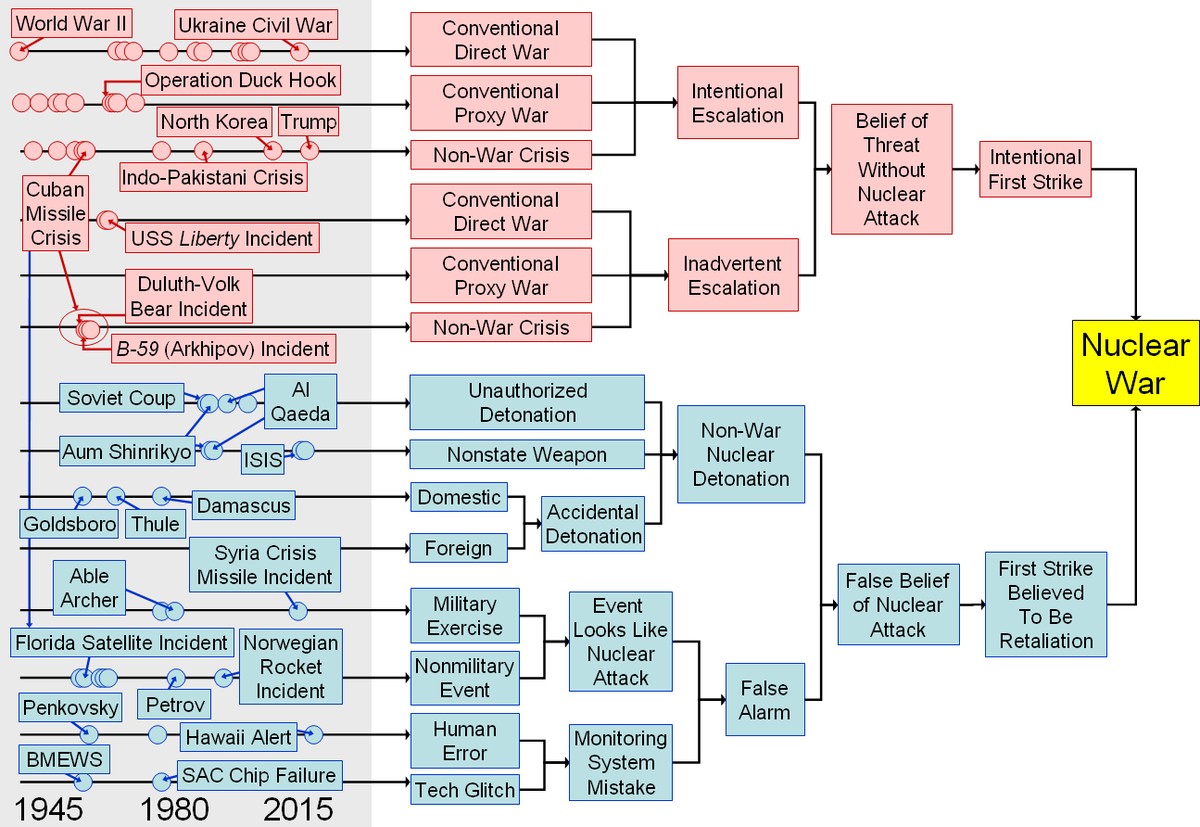So lots of people are interested in the probability of nuclear war right now.
I have studied the probability of nuclear war about as much as anyone (e.g., lead author on the model in the graphic shown below).
Here are my thoughts.
I have studied the probability of nuclear war about as much as anyone (e.g., lead author on the model in the graphic shown below).
Here are my thoughts.

1) There isn’t going to be any clarity on how large the probability is. It’s too opaque, too complex, too fast-moving.
2) In this instance, it’s OK to lack clarity on the probability. Sound policy & decision-making can proceed regardless, and that’s the important part.
2) In this instance, it’s OK to lack clarity on the probability. Sound policy & decision-making can proceed regardless, and that’s the important part.
3) I am especially worried about endgame scenarios in which Ukraine keeps winning and Russia/Putin run out of other options. Here are my preliminary thoughts on how to reduce nuclear war risk in those scenarios:
https://twitter.com/SethBaum/status/1579077137948196864
The endgame scenarios worry me because Russia/Putin may have incentive for nuclear attack. They’ve put so much on the line, it’s hard to just walk away. In that regard, the current moment is more worrisome than even the Cuban missile crisis—though let’s let the historians judge.
The Cuban missile crisis is one of many nuclear war “near-miss” events. A detailed accounting of such events from 1945 through 2018 is in my paper “A Model For The Probability Of Nuclear War”:
gcrinstitute.org/a-model-for-th…
gcrinstitute.org/a-model-for-th…
The rest of my nuclear war work is in the link below. The field of nuclear war risk analysis is not large, so for me to claim to be a top scholar on it isn’t saying much. But I still stand my expertise and my comments here. Now for some details.
gcrinstitute.org/nuclear
gcrinstitute.org/nuclear
Point #1: The probability of nuclear war is quantifiable, but only under certain forms of probability theory, especially subjective/Bayesian probability theory, in which probability is “quantification of a personal belief”
en.wikipedia.org/wiki/Bayesian_…
en.wikipedia.org/wiki/Bayesian_…
This from @russianforces only makes sense under frequentist probability theory, which is very limited. Compare to estimates of the probability of your sports team winning the next championship—which is also a unique event. That’s subjective probability.
https://twitter.com/russianforces/status/1579158046059945985
In other words, if we accept the validity of estimates of the probability of sports teams winning championships, then we have to also accept the validity of estimates of the probability of nuclear war. Both are subjective judgments of novel events.
Next: Attempts to estimate the probability are highly uncertain and should be viewed skeptically. All such estimations are, one way or another, some person’s best guess. For this sort of parameter, best guess judgments are unreliable. See:
pnas.org/doi/abs/10.107…
pnas.org/doi/abs/10.107…
People’s probability estimates are reliable when they have lots of practice. Example: weather forecasters. If they say 20% chance of rain on 100 days, it probably rains on about 20 of those days. Nuclear war is not like this. We don’t have lots of practice—fortunately!
Next: Knowledgeable experts are likely to disagree, and it’s very difficult to resolve who’s right. For example, @BrunoTertrais finds a relatively low probability. I have read his scholarship and can say his thinking is very well-informed.
https://twitter.com/BrunoTertrais/status/1579163718503796737
For comparison, here @Stanovaya suggests a relatively high probability: “If these demands are not met—and it is safe to say they will not be—Russia will resort to the nuclear option”. The “will resort” seems too deterministic but suggests high probability
foreignaffairs.com/russian-federa…
foreignaffairs.com/russian-federa…
There is a theoretical argument that disagreement between experts is fundamentally resolvable, resulting in everyone having the same probability estimate. However, in practice, this is at best a slow process—too slow for immediate purposes
en.wikipedia.org/wiki/Aumann%27…
en.wikipedia.org/wiki/Aumann%27…
I wouldn’t take much from the @tegmark probability numbers for the above reasons. Also, his model only accounts for one specific nuclear war scenario. A full accounting of the probability should cover all scenarios.
https://twitter.com/tegmark/status/1578911288859987968
For example, @tegmark assumes the first strike is Russia attacking Ukraine, but there is reason to believe the first strike could instead be Russia attacking NATO. To wit:
https://twitter.com/JuliaDavisNews/status/1573107219633438721
There are also scenarios involving accidental/unintended nuclear weapons launch. This is the bottom (blue) half of my nuclear war probability model: 

You might wonder, where do I stand on the probability? Instead of getting caught up on numbers, I am focused on the practical implications. I’m not yet at “head for the hills”, but there still is a significant risk that demands attention.
https://twitter.com/SethBaum/status/1577442369317658625
Things can change rapidly, but for now, the situation is still not completely terrible as @pwnallthethings points out. Perhaps we’ll learn more soon regarding Russia’s response to the Kerch attack. I am not qualified to make predictions on that.
https://twitter.com/pwnallthethings/status/1578910038957359104
Meanwhile, whatever the probability may be, we should actively try to reduce it. That's the take-away message, and it doesn't depend on exact probability numbers. My preliminary thoughts on how to do so are below; all are encouraged to contribute.
https://twitter.com/SethBaum/status/1579077137948196864
UPDATE: Some reactions to the new Russian missile attacks on Ukraine here:
https://twitter.com/SethBaum/status/1579483510657929218
Update: Here is a thread of threads, if you’d like to see all of the various threads I’ve been posting.
https://twitter.com/SethBaum/status/1580547150731091968
• • •
Missing some Tweet in this thread? You can try to
force a refresh







